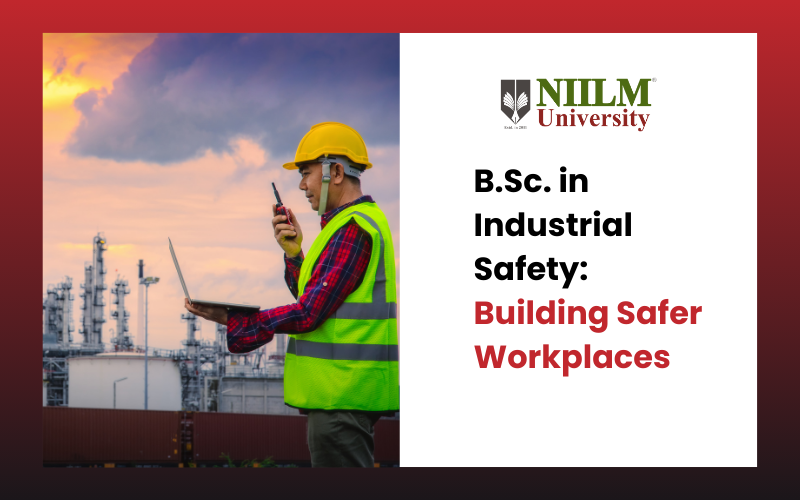Admission Enquiry

Promote safer workplaces with a B.Sc. in Industrial Safety from NIILM University. Learn essential skills to ensure industry safety.
In today’s fast-paced industrial landscape, ensuring safety in the workplace is not just a regulatory requirement; it's a fundamental component of a successful business strategy. The Bachelor of Science in Industrial Safety is emerging as a pivotal program that equips future professionals with the skills needed to foster safe working environments. This blog explores the significance of this degree, its curriculum, and the crucial role it plays in building safer workplaces.
What is a B.Sc. in Industrial Safety?
A bachelor's degree program in industrial safety, known as the B.Sc. program, aims to provide students with the information and abilities needed to support safe working conditions in a variety of industries. In order to prepare graduates for positions in occupational health and safety, this degree integrates concepts from engineering, health sciences, and management.
Importance of a B.Sc. in Industrial Safety
This degree is crucial for developing a safety culture in businesses, decreasing accidents, and making workplaces safer. Employers can save expenses, increase productivity, and safeguard the health of their workforce by funding industrial safety education.
Why Pursue a B.Sc. in Industrial Safety?
1. Occupational Health and Safety Administration (OSHA) standards
2. Hazard identification and risk assessment
3. Emergency response planning
4. Environmental health regulations
Key Components of the Program
Safety Regulations and Standards: To guarantee compliance, be aware of industry norms and OSHA laws.
Risk Management: Recognizing possible risks and putting risk-reduction measures into action.
Accident Investigation: Analyzing incidents to determine root causes and prevent future occurrences.
Emergency Response: Developing plans and protocols for emergency situations and training personnel.
Ergonomics: Designing workspaces and processes to enhance worker comfort and productivity while minimizing injury risks.
Subjects in Industrial Safety
Fire Safety and Prevention: Principles of fire safety, including prevention, detection, and emergency response.
Safety Audit and Inspection: Conducting safety audits and inspections to identify hazards and improve safety practices.
Process Safety Management: Managing safety risks associated with industrial processes, including hazard analysis and safety systems.
OSHA Compliance: Detailed instruction on OSHA standards and compliance strategies.
Occupational Health and Safety: Health hazards in the workplace and methods to prevent occupational illnesses and injuries.
Risk Management: Identifying, assessing, and mitigating risks to ensure workplace safety.
Hazardous Materials Management: Safe handling, storage, and disposal of hazardous substances, including regulatory compliance.
Environmental Health and Safety: Reducing the negative effects on the environment and making sure that environmental laws are followed.
Emergency Response Planning: Preparing for and managing workplace emergencies effectively.
Practical Experience: Practical elements can be included in various curricula, such as field projects, lab work, and internships. Students are able to apply their theoretical knowledge through these experiences, which enhances their understanding of workplace safety and prepares them for profitable employment in the field.
Career Opportunities with a B.Sc. in Industrial Safety
1. Safety Officer/Coordinator
In charge of carrying out safety audits, putting rules and procedures into effect, and educating staff members on safe practices.
2. Risk Manager
Focuses on finding, evaluating, and reducing hazards inside a company while making sure that safety rules are followed.
3. Compliance Officer
Ensures that the organization adheres to legal and regulatory safety standards, conducting inspections and maintaining documentation.
4. Safety Consultant
Provides expert advice to organizations on improving safety practices, conducting assessments, and developing safety programs.
5. Health and Safety Trainer
Creates and administers employee training courses on hazard identification, emergency response, and safety procedures.
6. Industrial Hygienist
Evaluates workplace environments to identify health hazards and recommends control measures to protect worker health.
7. Environmental Safety Specialist
Focuses on establishing sustainable working practices and making sure environmental rules are followed.
8. Safety Manager
Oversees the safety department within an organization, managing safety initiatives, budgets, and staff.
Industries That Hire Graduates:
Manufacturing
Construction
Healthcare
Oil and Gas
Transportation
Education
Government and Regulatory Agencies
The Role of Technology in Industrial Safety
The equipment and processes used in industrial safety are always changing along with technology. The way that technology is being incorporated into safety procedures is changing, from drones being used for site inspections to sophisticated data analytics, predictive modeling, and more. Students who pursue a B.Sc. in Industrial Safety are better prepared to take advantage of these developments and meet the demands of contemporary safety.
Building Safer Workplaces: A Collective Effort
Although education is an essential resource for improving workplace safety, it's important to understand that creating a safe workplace requires teamwork. To promote a culture of safety, employers, workers, and safety experts must collaborate. This method requires constant training, honest communication, and a dedication to continuous growth.
Conclusion
In conclusion, a Bachelor of Science in Industrial Safety is a dedication to creating workplaces that are safer for all employees, not just one. This curriculum improves individual careers and adds to the general safety and well-being of the workforce by providing graduates with the required information and skills. A B.Sc. in Industrial Safety is a big step toward a safer and more sustainable future in the industrial sector in a world where safety holds the highest priority.
Frequently Asked Questions (FAQs)
Q1. Why is industrial safety important?
A1. It protects workers' health, reduces accidents, ensures regulatory compliance, and improves productivity and morale.
Q2. What skills will I gain from a B.Sc. in Industrial Safety?
A2. Skills in hazard identification, risk assessment, safety management, regulatory compliance, emergency response planning, and accident investigation.
Q3. Are there practical components in the B.Sc. in Industrial Safety program?
A3. Yes, including internships, lab work, and field projects for real-world application.
Q4. What is the role of a Safety Officer?
A4.Implementing safety policies, conducting audits, training employees, and ensuring regulatory compliance.
Q5. How does a Risk Manager contribute to workplace safety?
A5. By identifying hazards, assessing risks, and developing mitigation strategies.
Copyrights © 2024 NIILM UNIVERSITY. All rights reserved.